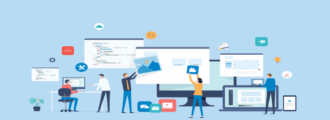Organizations looking to improve revenue, productivity, and other business processes rely on two types of software solutions—enterprise resource planning (ERP) and customer relationship management (CRM).
ERP helps companies manage the entire process, like accounting, procurement, human resources (HR), and more. It essentially handles the back office of the business. CRM is all about the customer lifecycle and experience, which is referred to as the front office.
These systems have a lot of similarities. They both serve as a source of data and are used across multiple departments. However, most organizations buy these tools separately and rely on integrations as needed.
This article breaks down the differences between ERP vs. CRM and how organizations can take advantage of both software components to improve their businesses. Let’s get started.
What is Enterprise Resource Planning
An enterprise resource planning (also known as ERP) solution combines business processes from many different departments within an organization, including finance, logistics, HR, and more. It can even handle supply chain management and risk management. ERP software can be deployed on premises, in the cloud, or a hybrid model.
An ERP system brings together an organization’s shared data from financial and operational systems. It eliminates data duplication and gives organizations reliable, accurate information in one place. There are many different ERP solutions on the market. Some of the most well-known are JD Edwards, SAP, Infor, Workday, and Microsoft Dynamics.
There are many benefits to using ERP software, including:
- Enhanced visibility into operations and data
- Streamlining business processes
- Improved business processes and collaboration
- Single database for all financial and operational data
What is Customer Relationship Management
Customer relationship management (also known as CRM) is a technology that manages your organization’s customer interactions, relationships, and data. For example, a sales rep can enter information after a call with a prospect. That information can then be used by the marketing team to tailor a new, personalized piece of content.
CRM tools are used across the entire customer lifecycle, including sales, marketing, and customer service, giving your teams a more streamlined way to manage those relationships. The world’s #1 CRM platform is Salesforce.
The benefits of standalone CRM systems include:
- Higher conversion rates from prospects to customers
- Richer, more meaningful customer data
- Enhanced customer experience
Difference between ERP vs. CRM
The main difference between an ERP and CRM system is the data it holds. ERP systems are used for financial data, and CRM software is all about customer data. Salesforce, for example, is not an ERP system because it doesn’t handle transactional data. However, most companies use integrations between the two systems to bring the data and information together.
Similarities between ERP vs. CRM
ERP and CRM share some similarities. They’re both available on premises and cloud and are used for storing and analyzing data. Both are critical software solutions for any size organization, from enterprises to small businesses.
CRM functionality and features
Marketing campaigns
CRM systems are critical for marketing teams and strategies. It can manage your marketing campaigns across many different platforms like email, social media, and digital. For example, if you wanted to target an email campaign for customers in the retail industry, you can use your CRM data to segment that list. It also helps you guide your prospects through the sales funnel and build your sales pipeline.
Customer support
A CRM system is equipped with tools to help customer service departments manage customer support and service. It brings together emails, messages, call centers, and live chats into one platform. Once a support ticket is created, you can track the entire process through your CRM software. With access to rich customer data, your support reps can better manage customer issues and deliver high-quality customer support.
360-degree view of the customer
Your CRM system gives you a complete view of all your customer data. This is vital for improving customer relationships and experiences. The data shows you the full history of customer interactions, purchases, issues, and support tickets, all in real time. And if information changes, you’ll get notifications and alerts.
Sales processes
A CRM system is extremely important when it comes to managing the sales process. With sales force automation, your leads from marketing get automatically added to the sales funnel. From there, your sales reps can engage those leads and also understand any pain points in the process. This will help you manage sales projections and business growth.
ERP functionality and features
Financial management and accounting
Most ERP systems are used for managing the financial aspects of the business, including employee payroll. ERP software is also used for accounting purposes to keep track of accounts receivable and payable. The tools can help you stay up to date on purchase orders, cash flow, and budgets. This helps your finance department maximize business growth.
Order management
An ERP system can give you visibility into the entire order and inventory management process. It tracks product availability, fulfillment, shipping, and delivery for both the company and the customer.
Supply chain management
An ERP system streamlines supply chain management by creating effective scheduling. It automatically creates supply and demand forecasts using real-time and historical data to help companies respond to ever-changing supply chains. An ERP system ensures that production is consistent with demand and replenishment happens at the right time, so your inventory stays lean.
Human resources
While your CRM system manages customer relations, your ERP manages employee relations. An ERP system helps human resources teams keep track of everything from hiring and onboarding to insurance and liabilities in a centralized system. This helps companies with a global presence better manage core business processes for the entire organization.
Do You Need ERP and CRM Systems?
At this point in the article, you’re probably wondering if you need both ERP and CRM systems to support your business. The two tools offer many benefits to business management.
The CRM focuses on the customer and helps your sales team drive leads, increase sales, and improve customer relations. It also supports the efforts of your marketing and customer support teams.
An ERP system takes care of everything your organization needs internally. It manages orders, supply chains, human resources, and finance. It oversees shipping and deliveries and can even help you plan for new products.
If you’re a small company, you could start with CRM software. It has all the functionality to help get your business off the ground. There are several CRMs on the market with some basic accounting and inventory tools. The same goes for ERP systems that contain some customer management functionality.
However, if you’re a growing company or large enterprise with a global workforce, you’ll need both CRM and ERP systems to manage core business processes and customer relations.
ERP and CRM Software Experts at Surety Systems
If you’re trying to determine if ERP or CRM software is right for your business or ready to start implementing the tools, the team at Surety System can help.
Our senior-level consultants have experience with the most popular software, including Salesforce, JD Edwards, SAP, Infor, Workday, Microsoft Dynamics, and more.
Contact us today to learn about our services and how we can improve your business with the right tools.


